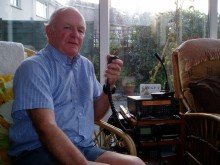My introduction to amateur radio began at the age of 12. The first receiver I built was a crystal set which required wearing heavy headphones and having a long piece of wire down the garden called the aerial, from which I could listen to stations on the medium and long wave bands. By 14, I was making my first valve radio, which meant I could listen to stations much further away.
Leaving school at 15, I went into the Royal Air Force as a boy entrant and was stationed at RAF Cosford in the Midlands. I was training as a Ground Wireless Mechanic. Equipment built for the forces in the early days could weigh half a ton in comparison to the equipment of today. You can now get the same performance from a small hand held transceiver.
Having an interest in amateur radio as a hobby and having passed a City in Guilds examination and also passing the 12 words per minute Morse code test (which is not now required) I then built my own radios and transmitters which enabled me to communicate with radio amateurs all over the world.
‘OFCOM’, at completion of an exam pass, will then give you a license with which you can use up to 10 watts power output. Other stages can then be learnt for more advanced licenses and eventually you can use up to 400 watts output. Ofcom have full control of your license and radio bands and also the allocation of frequencies allowed. My full license was issued in 1970 and my call sign is G3ZGP.
I have made friends through amateur radio in far off countries, to name a few, Australia, Canada and the USA. I have probably spoken to amateurs in a 100 different countries and have received confirmation from many of those countries, with a special colourful card with ones call sign across the front. This card is called a QSL card.
THE RADIO SOCIETY OF GREAT BRITAIN (RSGB) (Patron HRH Prince Philip, Duke of Edinburgh, KG, KT.)
The RSGB represents and supports all the radio amateurs in the UK and gives information on all aspects of the hobby, supported by a monthly magazine. The RSGB covers planning advice regarding applications for erecting aerials on your property, work with Ofcom to fight for the rights of radio amateurs who are trying to keep their frequencies, arrange contests to see how many people that you can contact and communicate with in an allotted time – where a certificate or trophy may be awarded to the winner, organize radio rally’s which you can attend and buy equipment and meet people that you have spoken to over the air, and many other aspects to help the radio amateur.
Joining a local radio club which may be advertised by the RSGB, is a great source of help and information for like minded radio builders, and also for a social outlets which may include talks on radio, local contests, direction finding and table sales of radio equipment. Another source of excellent information is a magazine called “The Practical Wireless” which can be ordered / obtained from most local news agents.
If you are house bound or have similar problems being able to communicate with other amateurs can help to make life much more bearable, a very good start to becoming an enthusiast is to become a short wave listener where you can learn the jargon and abbreviations used by amateurs.
Part of the fun of amateur radio is that with modern equipment it does not take up too much room. If you have and use a spare room it is known as “The Radio Shack”, a station may be installed in the lounge area or similar as long as you can get your aerial cables to your user space.
Going portable has its benefits, for example, being able to get away from manmade electrical interference. One can access a modest station at the top of a hill by using a portable radio (P).
A contribution I made some years ago was to design and build an aerial called a 2 element delta loop beam for 20 metres which was published by the RSGB. This gave very good results in talking to amateurs around the world.
If after reading this and you wish to gain extra information on receivers and equipment etc…, try ‘Practical Wireless’, or contact the RSGB website at https://www.rsgb.org/.
In amateur radio jargon 73 means good wishes from Richard. G3ZGP.







